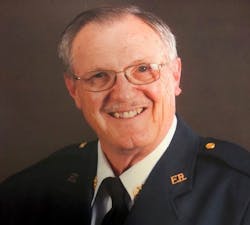Election Time Remains Vital for Volunteer Fire Departments
The two men seeking the highest office stood stoic, awaiting the beginning of the meeting. It was hoped both men would be able to articulate why they should be elected and be able to provide their vision for the future.
As the questions started, one candidate continually interrupted, the other candidate shot back with snide remarks. It soon became a shouting match, the moderator tried to get control of the meeting, but he was unable to get order. Those attending soon joined in the fray with yelling and screaming back and forth to provide support for their candidate. Young people in attendance that had never participated in an election were horrified at the chaos.
No, this is not a synopsis of the first presidential debate, but could be election night in your local firehouse. Yes, election season for many volunteer fire departments across America is upon us. I have been a party to company meetings described above. And as the president of a volunteer fire department, I can attest it is at times difficult to keep the peace in the meeting. With diverse members from all walks of life, varied backgrounds, education and political party affiliation, maintaining order in a department meeting can sometimes be challenging, and can be even worse on election night.
Fire department elections are a different kind of animal. Firehouse politics can be brutal. J. Millard Tawes was a charter member of the Crisfield, MD, Fire Department and a past president of the Maryland State Firemen’s Association when he was elected governor of Maryland in 1959. As the story goes, when he arrived in the state capitol of Annapolis for his inauguration, a reporter asked if he was ready for the tough political scene in Annapolis. Supposedly, Governor Tawes replied, “The Democrats and Republicans don’t have a damn thing on the firemen.”
Historically, volunteer fire companies have even had an effect on state and national politics. When the former Vice President spoke at the Congressional Fire Service Caucus Dinner in Washington, DC, he'd often say his home state of Delaware has three political parties: Democrats, Republicans and firemen. Rival volunteer fire companies in Baltimore were at the heart of the “Know-Nothing” election riots in Baltimore in 1856. Actions were violent and even fatal between fire companies supporting candidates. The Baltimore volunteers are probably the reason Maryland was the only state to cast electoral votes for the “Know-Nothing” candidate Millard Fillmore.
Firehouse elections can be almost as brutal. How many times has a fire chief lost an election and never set foot back in the fire station. Often that leadership and experience is out the door forever. How is your chief or ranking operational officer elected? Fortunately, in today’s environment, training, experience and qualifications are usually a key to enable a member to run for chief. Often, there is a progression of operational leadership and experience chain that must be followed to run for chief.
Are all members allowed to vote for all officers to be elected? Do non-operational members vote for the chief and other operational officers that may also be elected? When I attended my first fire company election, I noticed one of the fire company Cadillac ambulances pull up out front of the station. Soon, men with canes, or in wheel chairs, were walking (barely) through the engine bay to cast their vote for company officers. On election night, one ambulance actually drove to local nursing homes to transport members to vote.
There are two schools of thought. The old school perception is a member is a member and should have the right to vote for all offices. More recently, many companies have amended their constitution, by-laws or rules of government to require at least some form of operational requirements to vote for line officers. This logic is based on believing a person voting should have some knowledge of operations in order to vote for line officers.
Many volunteer fire departments have eliminated electing subordinate officers and give the latitude to the chief to select his junior staff. Some fire departments require his selections be approved by a board of directors. Some fire departments have completely eliminated the election of operational officers and appoint all line officers at the board of directors through an application process.
We have progressed forward with qualifications to run for chief, but we do not have the same prerequisite for administrative officers. Many volunteer fire departments are the largest or one of the largest businesses in the town. The president of a volunteer fire department is truly a chief executive officer of a corporation. Yet, normally the only qualifications to become the president of a volunteer fire department is one more vote than the other guy or girl.
As much consideration must be given to administrative officers as line officers. When selecting a president, you should envision that person representing the fire department in front of a government meeting. How would that person be able to perform as a witness in a civil court case if subpoenaed? Do the candidates for president have any business or government background? Can they run a meeting?
As you go down the administrative officer listing, you must also view the additional officers for their ability to handle their respective position. A person that will be the secretary of the corporation must be able to take complete and accurate minutes. The minutes are the legal documents that reflect the actions of the fire department. These records would be admissible as court evidence in the event of legal action against the fire department.
The treasurer of your fire department is a vital link in the corporate chain. I am aware of numerous volunteer fire departments that have lost their 501 (c) 3 status, lost their state charters or been hit with large amounts of funds embezzled from the fire department by the treasurer. A highly qualified and trustworthy individual is a requirement to assure the financial stability of your fire department.
The board of directors, trustees or managers, whatever term you use, should be a cross section of individuals that can provide guidance, wisdom and honest opinions on how your department operates. The board of directors should be the heart of the fire department that can guide your department and provide advice on internal issues such as needed repairs and anticipated expenses.
The volunteer fire and rescue service of today is a professional business that has the trust and responsibility of the community to provide efficient emergency services and operate in an efficient and cost effective manner. The membership of the fire department must make informed decisions when voting for both administrative and operational officers. But members running for office buying donuts at the morning coffee club doesn’t hurt!!
About the Author

Clarence Jewell
Clarence “Chip” Jewell is in his 54th year as an active volunteer. He is a life member of the Libertytown, MD, Volunteer Fire Department and the Junior Fire Co. No. 2 in Frederick, MD. Jewell retired in 2017 as the deputy chief/director of the Frederick County, MD, Division of Volunteer Fire & Rescue Services, a combination service that consists of 25 independent fire and rescue companies, 600 operational volunteers, 1,700 volunteers and more than 400 career personnel. He has a bachelor's degree in fire science from the University of Maryland/University College. Jewell is a management-level instructor for the Maryland Fire and Rescue Institute. He is active on several committees of the Maryland State Firemen’s Association.
